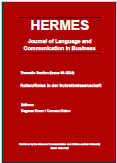Rollenveränderungen bei der studentischen Textproduktion mit KI. Ergebnisse einer bundesweiten Studierendenbefragung
DOI:
https://doi.org/10.7146/hjlcb.vi64.153161Keywords:
ChatGPT, AI, academic writing, university, survey, writing competenceAbstract
Since the release of ChatGPT, generative AI has significantly changed student academic writing and students’ role in the writing process. This article presents the results of a survey conducted in August/September 2023, including 3,997 evaluated questionnaires. The survey aimed at recording students’ use of text-generating AI tools for academic writing, specifically frequency of use, reasons for and against AI use, purposes of use, and attitudes towards AI use, as well as their wants and needs for support provided by university stakeholders. Based on the hypothesis that students’ existing writing competence influences their AI use, they were also asked to self-assess their writing competence, which was then correlated to other questions.
Key findings are that the majority of students tend to use AI writing tools on a rather regular and reflected basis, with a stronger awareness of weaknesses in content rather than regarding data protection, copyright, and ethical aspects. A minority of students do not use the tools at all or in an unreflected manner, such as generating complete texts. Students express a great need for clear regulations and information on how to use AI in academic writing. Correlations between writing competence and AI use and assessment can be observed consistently, but to a very limited extent, indicating that students with higher writing competence use AI in a slightly more reflected and targeted manner. The results can assist universities in developing support for students to learn a reflective approach to AI writing tools in academic writing.
References
Brommer, S., Berendes, J., Bohle-Jurok, U., Buck, I., Girgensohn, K., Grieshammer, E., Gröner, C., Gürtl, F., Hollosi-Boiger, C., Klamm, C., Knorr, D., Limburg, A., Mundorf, M., Stahlberg, N., & Unterpertinger, E. (2023). Wissen-schaftliches Schreiben im Zeitalter von KI gemeinsam verantworten. Diskussionspapier Nr. 27 (S. 1–21) Hochschulfo-rum Digitalisierung. https://hochschulforumdigitalisierung.de/wp-content/uploads/2023/11/HFD_DP_27_Schreiben_KI.pdf
Buck, I., & Limburg, A. (2023). Hochschulbildung vor dem Hintergrund von Natural Language Processing (KI-Schreibtools): Ein Framework für eine zukunftsfähige Lehr- und Prüfungspraxis. die hochschullehre 9. 70–84. https://www.wbv.de/shop/Hochschulbildung-vor-dem-Hintergrund-von-Natural-Language-Processing-KI-Schreibtools-.-Ein-Framework-fuer-eine-zukunftsfaehige-Lehr-und-Pruefungspraxis-HSL2306W
Elbow, P. (2007). Voice in Writing Again: Embracing Contraries. College English, 70(2), 168–188.
Garrel, J. von, Mayer, J., & Mühlfeld, M. (2023). Künstliche Intelligenz im Studium – Eine quantitative Befragung von Studierenden zur Nutzung von ChatGPT & Co. https://opus4.kobv.de/opus4-h-da/frontdoor/index/index/docId/395
Gesellschaft für Schreibdidaktik und Schreibforschung [gefsus] (2022). Positionspapier Schreibkompetenz im Studium. (S. 2–20). Verabschiedet am 29. September 2018 in Nürnberg. https://www.gefsus.de/component/osdownloads/routedownload/startseite-feld-positionspapier/positionspapier-2022-felder-download-startseite?Itemid=173.
Golombek, C., Klingsieck, K. B., & Scharlau, I. (2019). Assessing Self-Efficacy for Self-Regulation of Academic Writing. Development and Validation of a Scale. European Journal of Psychological Assessment 35(5), 751–761 https://doi.org/10.1027/1015-5759/a000452
Hoffmann, N., & Seipp, T. (2015). Förderung studentischer Schreibkompetenz. Ergebnisse einer Umfrage bei Lehrenden und Studierenden der JGU Mainz. Zeitschrift Schreiben, 1–13. https://zeitschrift-schreiben.ch/globalassets/zeitschrift-schreiben.eu/2015/hoffmann_seipp_foerderung_schreibkompetenz.pdf
Kruse, O., & Chitez, M. (2014). Schreibkompetenz im Studium. Komponenten, Modelle und Assessment. In S. Dreyfürst, & N. Sennewald (Hrsg.), Schreiben: Grundlagentexte zur Theorie, Didaktik und Beratung (S. 107–126). Barbara Bud-rich.
Leschke, J., & Salden, P. (2023). Didaktische und rechtliche Perspektiven auf KI-gestütztes Schreiben in der Hochschulbil-dung. Ruhr-Universität Bochum. https://doi.org/10.13154/294-9734
Preiß, J., Bartels, M., Niemann-Lenz, J., Pawlowski, J., & Schnapp, K.-U. (2023). “ChatGPT and me”. Erste Ergebnisse der quantitativen Auswertung einer Umfrage über die Lebensrealität mit generativer KI an der Universität Hamburg. http://doi.org/10.25592/uhhfdm.13403
Rasul, T., Nair, S., Kalendra, D., Robin, M., Oliveira Santini, de F., Ladeira, W. J., Sun, M., Day, I., Rather, R. A., & Heathcote, L. (2023). The role of ChatGPT in higher education: Benefits, challenges, and future research directions. Journal of Applied Learning & Teaching 6(1), 41–56. https://journals.sfu.ca/jalt/index.php/jalt/article/view/787
Salem, L. (2016). Decisions...Decisions: Who Chooses to Use the Writing Center? The Writing Center Journal 35(2), 147–171.
Solis, T. (2023). Die ChatGPT-Richtlinien der 100 größten deutschen Universitäten. https://www.scribbr.de/ki-tools-nutzen/chatgpt-universitaere-richtlinien/
Weßels, D. (2023, 24. November). Die Transformation der Hochschulprüfungen: ChatGPT und die Zukunft der Bewer-tungskultur [Konferenzbeitrag]. Lehr-Lernkonferenz „KI in der Hochschullehre – Chancen und Grenzen des KI-gestützten Lernens und Lehrens“. https://www.hs-osnabrueck.de/fileadmin/HSOS/Homepages/LearningCenter/LLK_2023/Abstract_Keynote_Vortrag.pdf

Downloads
Published
How to Cite
Issue
Section
License
Copyright (c) 2024 Nora Hoffmann, Helena Grünebaum, Sarah Schmidt

This work is licensed under a Creative Commons Attribution 4.0 International License.
Authors who publish with this journal agree to the following terms:
a. Authors retain copyright and grant the journal right of first publication with the work simultaneously licensed under a Creative Commons Attribution License that allows others to share the work with an acknowledgement of the work's authorship and initial publication in this journal.
b. Authors are able to enter into separate, additional contractual arrangements for the non-exclusive distribution of the journal's published version of the work (e.g., post it to an institutional repository or publish it in a book), with an acknowledgement of its initial publication in this journal.
c. Authors are permitted and encouraged to post their work online (e.g., in institutional repositories or on their website) prior to and during the submission process, as it can lead to productive exchanges, as well as earlier and greater citation of published work (See The Effect of Open Access).




